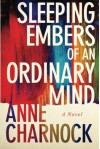Reflections
Eager reader of history, mystery, classics, biographies, steampunk, lit fic, science, scifi, and etc. My reviews are mostly positive--I rarely finish or write about books I don't enjoy. My TBR is too high for that.
Captivating, people-centered science fiction
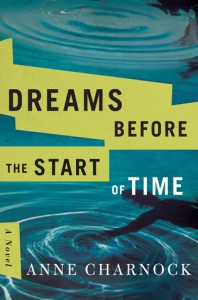
This captivating series of linked stories starts in the future and continues moving forward in time, exploring the ways plausible (if sometimes disturbing) advances in conception and birth options would change individual lives and the relationships between family members and lovers. The book spans several generations in the families of two devoted, but very different, best friends, Millie and Toni, who we meet in the first story. Each successive story features someone the reader has already met, making the implications of previous character choices, or in a few cases non-choices, poignantly clear.
Some characters stumble into relationships and parenting, others are highly purposeful. Some go down the old natural paths, others opt for high tech genetic enhancements for one or more of their children.
This is people centered science fiction, and almost all of the stories are thought provoking and don’t-want-to-stop-reading compelling. Most moving for me was finding out what happened to a genetically optimized “bottle baby”, meaning a fetus with traits chosen by his parents who was “carried to term” in a lab rather than a human womb. Gerard was orphaned before he was born and left unadopted in his “bottle” by the main characters of an especially haunting story. We meet Gerard again in another story much later in his life, as an adult, after he’d been raised in an institution setting among other orphans with genetic upgrades. Gerard has been living a perfectly constructed life, but now he’s grappling with the unexpected. A one night stand about 10 years ago resulted in a son he has only recently learned about, a boy who contrasts in marked and unexpected ways with the carefully planned son he’s raising with his wife.
I read an advanced review copy of this book supplied to me at no cost by the author. Review opinions are mine.
 5
5
Strange and dangerous though its world might be...

Strange and dangerous though its world might be, I was fascinated to be back in the technologically advanced, genetically enhanced, climate challenged future Manchester that Anne Charnock first explored in A Calculated Life. In that book the main character is Jayna, a simulant or lab created human who has been completely bio-engineered to have beyond genius level intelligence so she can process huge amounts of data for her employer, but in this novella we get a look at lives on the far other end of the human spectrum.
Caleb and Lexie have both been deemed unworthy for the cognitive implants that most natural born people receive to enhance their abilities. They eke out a living in the Enclave, a violent, gritty slum community far from Manchester’s hub. With a nod to current events, Caleb is a young illegal immigrant who had to flee Spain when climate change rendered his home virtually unlivable. Caleb and Lexie work together, but though they have a stronger bond than normally found in subordinate-boss relationships, the nature of their reality makes it hard for them to trust anyone.
Charnock writes what I think of as science fiction for grownups, stories in which realistic (if often futuristic) characters and thought-filled themes are as important as her high tension plots. While The Enclave isn’t exactly a sequel to A Calculated Life, those who’ve read the first book will recognize Jayna and her coworker Dave in a brief encounter they have with the characters in this novella. Even Dave’s bees make an appearance.
One thing left to explore in this world is the lives of the elite--the natural born (not lab created) humans who have been equipped with cognitive implants. They have best jobs and the nicest homes, but I wonder how life in this tenuous world would feel to one of them.
I received a complimentary copy of The Enclave from the author, with no obligation to write a review. Review opinions are mine.

 2
2

Butter: A Rich History includes science, social and culinary history, far flung travel adventures, farm and factory tours, recipes(!), and mouth-watering descriptions of the various qualities of different types of butter based on how it’s made and where it comes from--factors I had never thought to consider--so I was fascinated from page one. It also sent me off to my local grocery and farm stores where I was amazed and happy to see quite a variety of butter, including a beautifully yellow and tasty slow churned butter from cows who had not been fed grain but were instead allowed to field graze. Butter has gotten a bad rap health-wise, but author Elaine Khosrova counters some of those now outdated claims. I hadn’t known there was so much to learn about butter and its history and I enjoyed finding out more about something from my everyday world that I had taken for granted. The only slight issue I had was that reading this book made me hungry...
I received a free copy of this book from the publisher through the website LibraryThing. Review opinions are mine.
 3
3
Literary Wonderlands explored in gorgeous and thoughtful detail

This is a truly beautiful book, with gorgeous color illustrations on almost every page 2-page spread, so reading it, even flipping through it, is a delight. The first thing I did was check to see which of my favorite literary worlds had been included (Strange/Norrell! Thursday Next! And lots of others), and I read those entries feeling great pleasure and satisfaction to see the texts I love treated with such respectful and thought-provoking attention.
But discovering new-to-you authors is the biggest perk of Literary Wonderlands, with one very slight caveat. If you are someone who avoids spoilers at all costs (I am not), if your reading pleasure is diminished by knowing ahead of time some of what happens in a story, then you'll want to precede with caution. In order for them give substantial insights, quite a few of the entries contain summaries which tell in a very general way what happens in the book being featured. Since many of these books are well known classics, especially the older ones, I don't think this will be an issue for most readers.
The entries were authored by an impressive list of knowledgeable and talented writers, some of them scholars or historians, and some of them creators of their own literary wonderlands, like Lev Grossman (his The Magicians series is, sadly, not included in the book). Essays are arranged in 5 chronological groups: Ancient Myth and Legend, Science and Romanticism, Golden Age of Fantasy, New World Order, and The Computer Age ( a strange title choice because most of the stories in this group have nothing to do with computers). Most, but not quite all, of the authors are from Europe or the United States.
Literary Wonderlands would be a great holiday gift book for anyone (including yourself!) who loves to read.
I received a free copy of this book from the publisher with obligations. Review opinions are mine.
Gripping account of Churchill's prison escape, but even more fascinating insights into history

As she’s already proved in The River of Doubt and Destiny of the Republic, Candice Millard really knows how to tell a gripping story, and this account of young Winston Churchill’s incredible prison escape during the Boer War made me postpone all other activities as I stayed glued to its pages, but--as with her other titles--the event that inspired the book isn’t the only thing that makes Millard’s telling so interesting. For me it’s maybe not even the primary thing, though it’s true that episodes like Churchill desperately leaping onto a moving train and hiding out for days in a pitch-black, rat-infested coal mine were the parts that kept my heart racing.
But the insights into the history and cultural norms of the peoples involved in the story were even more fascinating for me than Churchill’s harrowing escapades. Millard gives concise but detailed backstories of the too complacent British and their empire in the waning days of Victoria’s rule, the fiercely independent and resourceful Boers who after a hundred years felt bound and entitled to the lands they’d settled in southern Africa, and the native African tribes of the area, including the Zulu and the Xhosa, some of whom had inhabited the space for thousands and thousands of years.
The book also gave me a deeper understanding of Churchill’s character, in all its admirable and infuriating glory. The roles of Mahatma Gandhi, Nelson Mandela (who lived years after the Boer War) and a number of officers in the British and Boer military are also well described, and the influences or thoughts of Catherine the Great, Kaiser Wilhelm II, Theodore Roosevelt, and the American President William McKinley are noted. All three of Millard’s books cover the late nineteenth century and/or early twentieth century, an era that to the benefit of her readers she seems to know well and is certainly able to bring to life.
I read an advanced review copy of this book supplied to me at no cost or obligation by the publisher. Review opinions are mine.
 5
5
 3
3
Ancient local religions in modern India
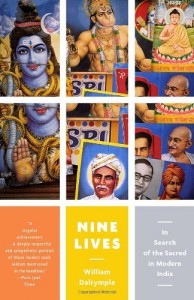
I just finished re-reading this amazing book--here's my original review from 2011:
The religions most of us are familiar with have been largely standardized and homogenized, but obviously this wasn’t always so. Like languages before the advent of writing, earlier versions of even the same religion had local accents, traditions and emphases that varied substantially from place to place. That early world of indigenous religions still exists in parts of India, and in Nine Lives author William Dalrymple sensitively chronicles the poignant, eye-opening personal stories of nine religious devotees whose practices are outside--sometimes far outside--of the mainstream.
The regional outlook of many of his subjects is summed up by one of the last hereditary singers of an ancient, locally-based epic poem that is so long it takes five eight-hour nights, dusk to dawn, to perform. He explained to Dalrymple that of course they were careful to propitiate the “national” gods like Shiva and Vishnu, who control the cosmos, but for their daily needs it made more sense to pray to the local god-kings and heroes who understand their farming life in a way the great gods could not. It’s like going to your county council representative rather than the president of the country to have a new stop sign put in your neighborhood.
Dalrymple must have a gift for getting people to open up, and he writes beautifully and with great respect for his subjects. Those subjects include a Dalit or untouchable who becomes a god sought out by Brahmins for several months each year, a Jain nun who is chaperoned by a naked monk part of the time Dalrymple speaks with her, a devotee of the fearsome goddess Tara who lives by the funeral pyres of a cremation ground, a blind wandering Baul who sings songs of worldly liberation, and a Tibetan Buddhist monk who is atoning for being forced to fight for his religious beliefs.
 1
1
What I read (and listened to)
Inspired by the upcoming summer release of the last book in Jo Walton's Thessaly Trilogy, which tells the story of the goddesses Athena's attempt to create Plato's Republic, I spent much of this month happily ensconced in the classical world of Greece (mainly) and Rome (a little). I re-read The Republic for the first time since I was 18, which is a little more than 4 decades ago... And I also listened to two audio courses on Plato and read a book of essays by Mary Beard about classical Greece and Rome.
I started the month with Myths, Lies, and Half-Truths of Language Usage, an audio course by my favorite linguist, John McWhorter. The Day of the Scorpion is the second book in Paul Scott's Raj Quartet, set in India during WWII, Dragon Day is a thriller set in modern day China, Bring the Monkey is a spoofy English country house mystery, and A Thousand Pieces of You is a YA novel that explores the multiverse--it was a reread for me. I was about to start its sequel and just planned to skim the last chapter to remind myself of where it ended, but then couldn't resist diving back into the whole book. My original review is here: A Thousand Peices of You--Racing through a Multiverse of Alternate Lives.
 12
12
 3
3
Favorite books of January, part 3
When Lucy Honeychurch arrives in Florence she’s feeling peevish and disappointed. After travelling abroad for the first time Lucy finds their little hotel filled with fellow Britons, and even the woman in charge speaks English with a Cockney accent. What’s the point of leaving England if you’re still surrounded by the same people? Plus, Lucy and her chaperoning cousin were promised rooms with a view of the Arno river, and instead their accommodations look over a courtyard. But when a rough around the edges man and his enigmatic son offer to switch rooms, Lucy’s horrified, uptight, passive-aggressive cousin (played by Maggie Smith in the 1985 movie) is sure that would NOT be proper. Lucy (portrayed in the film by Helena Bonham Carter) wavers, confused. Where is the balance between embracing experience and living within the rules of propriety? If I could give A Room with a View more than 5 stars I would. E. M. Forster writes beautifully, and he tells Lucy’s story with both sympathy and insight.
The Demon in the House and Summer Half are two of the 30(!) books in Angela Thirkell’s witty and wonderful Barsetshire series, set in Britain during the 1930’s and 40’s. Thirkell borrowed her imaginary English countryside setting from Anthony Trollope, and descendants of a few of his characters make appearances in her stories. Highly entertaining.
Moving, hard-to-put-down, sometimes heartbreaking, and utterly fascinating, Charlotte Bronte: A Fiery Heart is less massive than Juliet Barker’s The Brontes: Wild Genius on the Moors, but it’s a good choice for someone not ready to dive into the delights of Barker’s thorough, 1,000+ page tome. In spite of the title, Charlotte is the main but not only focus this new biography, because it also covers the lives of Emily, Anne, Branwell and their father--they were such a close family it would be impossible to leave any of them out. All four of the siblings were imaginative and obsessive writers so that from a very young age they were creating their own shared literary worlds. I especially enjoyed the way Harman related the novels the sisters published to their life experiences. Anyone who loves Jane Eyre, or who is interested in life outside of London during the middle of Victoria's reign, will find this biography fascinating. I read an advanced review copy given to me by the publisher; review opinions are mine.
 13
13
 2
2
Favorite books of January, part 2, three more books I loved
1) Powerful, poignant, and deep, Speak has an unusual structure, weaving together six narrative voices that together illuminate a link between the creation of artificial intelligence and the fundamental human yearning for connection. When I started the book its nonlinear format put me off, but it took just a few chapters for me to become totally hooked. The narrators include a Pilgrim or Puritan girl leaving her former life behind to journey to America, AI pioneer and WWII code-breaker Alan Turing, and a now illegal, slowly “dying” babybot--a doll of the future so lifelike and compelling that children who had one couldn’t bond with people--as it slowly loses power and memory.
I don't normally pay much attention to epigraphs, but I love Speak's. One is from Notes From Underground by Dostoevsky, while the other comes from what I think is Disney's Snow White:
“Slave in the magic mirror, come from farthest outer space, through wind and darkness I summon thee. Speak!”
2) Beautifully written and haunting in the sense that it leaves you with things to think about, Sleeping Embers of an Ordinary Mind completely captured me. Blending science fiction, art, and history, its three connected storylines span time--with one in the past, one in the present, and one in the future--but all revolve around the fifteenth century painter Paolo Uccello and his artistically talented daughter Antonia, two real life historical figures. A lot of research went into this novel, and I actually learned something about painting composition, art history and the possibilities of future technology.
3) I loved Between Mountain and Sea, and really didn’t want to leave the characters behind. Fortunately it’s the first of a sci-fi series that’s part of the Paradisi Chronicles, an intriguing multi-author project about 10 extended families who exit our devastated home world to set up colonies in New Eden, an Earth-like planet that already has native hominids. These original people are an interesting human variation, and several of them play important roles in the novel.
M. Louisa Locke, author of the Victorian San Francisco Mystery series that starts with Maids of Misfortune, is here telling the story of the Yu family, who have their roots in China. Mabel Yu was one of the original settlers and traveled from Earth as a young teenager. About 150 years later Mei Lin Yu, Mabel’s descendant, discovers Mabel’s diary, a fascinating document that tells the real history of the colony, not what Mei Lin has been taught at school. These new insights help Mei Lin question the path that’s been laid out for her, one that doesn’t suit her at all. Though Mei Lin is YA age, romance plays almost no role in the action--it’s more a coming of age book. As indicated by the title, the setting is vivid and wild, and while parts of the plot were a little predictable, I was so caught up in the world and the lives of the characters that I didn’t care.
 10
10
Favorite books of January, part 1
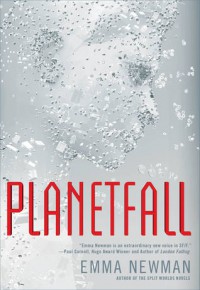
Intense, memorable, and deeply captivating, Planetfall manages to be character-driven and idea-filled without sacrificing action and suspense. The story involves space travel, an off-Earth colony 20-some years after its establishment in the shadows of a (mostly) abandoned alien structure, the biology-linked religious beliefs that inspired the colony’s creation, a first person narrator coping with and trying to hide her anxious obsessions, and life enhanced (or maybe diminished) by advanced technology that includes 3D printers, which create everything the colony needs from homes to cups, and implanted chips, which connect every person to the web and each other--making it difficult for the main character to keep her psychological challenges off the grid and out of sight. Being inside the head of a character struggling with compulsive behaviors was unsettling and fascinating, and felt uncomfortably close to some of my own mental processes. The ending is unlike anything I’ve read, savage, visceral, cosmic and sublime.
 13
13
 7
7
Witty novel on 1930's Britain

The Demon in the House is the third book of Angela Thirkell’s Barsetshire novels, and I wasn’t sure how I would feel about a story centered on a force of nature like the cheerfully self-involved, hyper-talkative, 12 or 13 year-old Tony Morland--the “demon” of the title--but for the most part I loved it. Many of the characters from High Risings, the first of Thirkell’s Barsetshire books, are back and it was a pleasure to catch up with old friends.
Several sections of the story evoke with breath-taking clarity the mostly unruly but sometimes sublime passions of childhood--especially chapter 5, which is titled Paradise Pool because Tony discovers a particularly lovely view of the lake where a group of grown-ups and children have gathered to picnic and swim. The youngsters are full of high spirits, playing, squabbling loudly, and running off with each other’s toys, but then Tony and his mostly silent friend Donk climb down to muck around in a stream that’s below the level of the main body of water, and from that lower angle the lake looms like a magic pool suspended in midair, a vision that awes and moves them both and temporarily silences the almost pathologically loquacious Tony--it’s a lovely piece of writing.
Thirkell apparently didn’t think much of her own books. Like Tony’s mother she wrote because she needed to earn a living and didn’t expect or want her well educated friends to read her novels, but but for “fluff” her stories are witty and socially aware. Because they were written during the time when they're set, in this case the 1930’s, the stories also offer interesting and often unexpected (to me) insights about the daily life and attitudes of the era, including a few eyebrow-raising off-hand comments by characters that are offensive today.
Virago is re-releasing many of Thirkell’s novels, but so far not not this one, which means that most or all of the available copies are the Moyer Bell editions which do have some editing errors.
 4
4
 8
8
I won!

I won this adorable Japanese steampunk fairy tale book from Yvette's always entertaining blog at Bookworlder
Thank you, Yvette! Now I want to read the rest of The Gunpowder Chronicles series, intriguingly described as "an Opium War steampunk adventure set in the 19th century empires of China and Japan."
 14
14
 4
4

Spoken by Lovey, the ships's AI, in a moment of friendly bantering with a tech on the crew who's sweet on her. (The feeling is mutual.)
 8
8
 9
9
Utopias in nineteenth century America
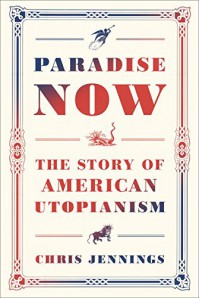
Deeply held convictions about religion, science, and the industrial revolution converged in mid-nineteenth century America and created a flurry of experimental utopian communities whose enthusiastic members hoped they were building model societies that would change the world. This fascinating, hard to put down, sometimes heartbreaking history profiles five of the hard working, ideal rich groups--the Shakers, New Harmony, the Fourierist phalanxes, Icaria and Oneida. While the utopians held many core ideas in common, some of their beliefs varied widely, from multi-partner free love to celibacy, but unity predominated so the groups supported each other, exchanged members, and saw themselves as fellow travelers.
Their results were mixed, with a few of the communities being more viable than the others, but none of them prospered in ways that made them catalysts for a global reorganization of civilization. In spite of that, many of the progressive views the utopians all agreed on were eventually embraced by the population at large, including the right of women to be treated equally, the benefits of strong public education for democracy, the advantages of a diverse society, the need for a social safety net, and the dangers of unchecked markets.
Though setting up these prototype paradises involved a lot of arduous labor, the morale and happiness of participants was boosted by their idealistic mission, common purpose and close community, making it heartbreaking for the utopians when their groups fell apart. At a time when most Americans lived much more isolated lives under social strictures that limited contact between men and women and people of different classes, members of the utopias lived, ate, and worked together during the day, and held dances, lectures, singalongs, assemblies, and/or classes in the evenings--high-times that sound like great fun even to this privacy loving introvert.
Because of social changes they helped inspire, utopian communities ultimately did have some impact on the way culture has advanced since the nineteenth century, which is why the author suggests that while we are now obsessed with dystopias and picturing how things could go very wrong, there would be value in following the lead of utopians by imagining what we think an ideal world would look like.
Paradise Now is full of poignant, lively, and engagingly written insights into the mid-nineteenth century zeitgeist--mainly the time before the Civil War. It’s detailed without being ponderous, and reflective without being opinionated. I found it utterly riveting.
I read an advanced review copy of this book provided by the publisher at minimal cost to me. Review opinions are mine.
 12
12
Interesting setting makes this mystery stand out
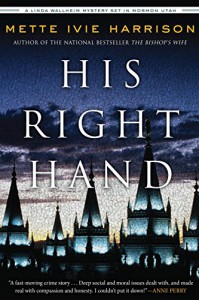
I found this second mystery by Mette Ivie Harrison almost as enthralling as the first, in spite of the fact that I guessed the solution before the end. What sets this series apart is its setting in a modern mainstream Mormon community, a group I don’t know a lot about, and the open, intimate tone of the story. This time the characters are struggling with ripped from the headlines issues of sexual identity and acceptance of difference.
Main character Linda Wallheim, the wife of a bishop, is a devout believer but has some troubling questions about her church’s policies and power structure. Her marriage is generally good, but not without challenges, and she’s at loose ends because her youngest son has all but moved out of the house. When her husband’s rigidly traditional colleague is murdered Linda becomes deeply involved in helping the victim’s distraught, almost unhinged widow and two teenage children. This puts her in a position to notice disturbing patterns which could help solve the crime, drawing Linda further into dangerous circumstances, but church higher-ups insist that some aspects of the situation be kept from the public, hampering the police investigation.
The author is a Mormon herself and I greatly enjoyed having a glimpse into that community. It’s a moving, family-focused story and the non-murder themes have some basis in reality--Harrison explains in the afterword that the idea for the book came from an incident she witnessed firsthand.
 13
13
Eye-opening and highly readable biogrphy

This short book packs a lot into its 151 pages of text, and doesn’t pull any punches in its chronicle of the life and family background of Benazir Bhutto, a fascinating and complex woman. It also tells the turbulent history of Pakistan, from its origins up to almost the present day, which is at least as interesting as Bhutto’s personal story.
Exceptionally charismatic, Bhutto has a mixed legacy that continues to inspire some, including Malala, the Pakistani Nobel Peace Prize winning teenager who’s an activist for female education, but Bhutto was not free from the taint of corruption and wasn’t completely what I naively expected. Her family is still active in Pakistani politics, making this book especially relevant.
The author, Brooke Allen, was able to obtain personal insights from people who had been close to Bhutto, but she also uses what she terms the “foundational research” of other writers and the book is heavily footnoted citing her sources. Eye-opening and highly readable.
I read an advanced review copy of this book supplied by the publisher. Review opinions are mine.
 4
4

















